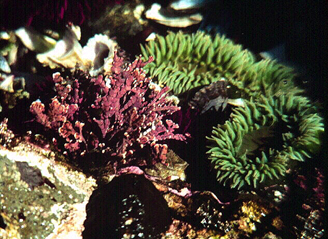September 26 – December 8, 2023
BI 211, 212, and 213 are prerequisites for all courses.
BI 458/558 Biological Oceanography (5 quarter hour credits) ) Examines the patterns of biological productivity and controlling physical and chemical mechanisms in the various environments of the world’s oceans. We will study and quantify the dynamics of key oceanographic processes at different spatial and temporal scales and how these impinge on marine ecosystem composition, structure and functioning. Involves field excursions and laboratory work. Meets on Mondays 8:30 – 5:00 Instructor: Michael Ahrens
BI 454/554 Estuarine Biology (5 quarter hour credits) The biological and physical factors regulating production, abundance, distribution and diversity in estuaries. Includes field trips to marshes, tide flats, eelgrass beds and open waters. Meets Tuesdays 8:30 – 5:00. Meets on Tuesdays 8:30 – 5:00. Instructor: Richard Emlet
BI 457/557 Marine Biology: Molecular Marine Biology (5 quarter hour credits) An introduction to applying molecular biology to research using marine organisms. Lectures and readings examine the use of molecular data in taxonomy and systematics, population structure and conservation biology, and morphological and developmental evolution. Lab exercises include analysis and interpretation of existing data sets and the generation of new data using basic methods. Students acquire practical laboratory skills including collection and preservation of material for molecular work, DNA extraction, PCR amplification of suitable target genes, sequence analysis, and building and interpreting phylogenetic trees. Meets Wednesdays 8:30am-5:00pm. Instructor: Svetlana Maslakova.
See what students are saying about this course.
BI 457/557 Marine Biology: Marine Environmental Issues (5 quarter hour credits) Issues that influence biological diversity of marine environments are approached from a global scale, and from real world examples from the local environment. We will examine several local applied conservation case studies with guest speakers and field trips. We will take an integrated approach to explore global climate change, conservation, fisheries, habitat alteration, introduced species, and pollution in the marine environment using readings, seminars, and peer-reviewed writing. Meets Thursdays 8:30 -5:00. Instructor: Aaron Galloway
BI 457/557 Marine Biology: Cell Physiology in the Marine Realm (4 quarter hour credits) This course covers fundamental topics in cell biology of eukaryotes, with a focus on marine organisms in relation to their lifestyle in the natural environment. Specific topics will include the cell cycle and cell division; the cytoskeleton and intracellular organization; cell motility, cell shape change, and related behaviors in both protists and animal cells; and multicellularity in various groups. Fulfills Area 1 major requirement. REMOTE/SYN course; weekly discussion and review Fridays 1 – 3:30. Instructor: George von Dassow
BI 410/510 Cell Physiology Lab (2 quarter hour credits). Labs focus on practical light microscopy on living material, including invertebrate eggs, embryos and larvae, as well as diatoms, dinoflagellates and other algae and protists. BI 457/557 Cell Physiology Lecture MUST be taken concurrently. Meets in-person only. Fridays 8:30 – noon. Instructor: George von Dassow
BI 407/507 Seminar: Marine Biology (2 quarter hour credits)
Speakers from a number of different universities present their research interests. Fridays 4:00 pm
BI 401 Undergraduate Research (2-10 quarter hour credits) Students conduct a research project under the direction of an OIMB faculty member. Email the person with whom you wish to work to arrange for registration. Limit 8 students.
All students registering for OIMB courses should fill out an application for admission (see application form link above right) and, if needed, request room and board. Questions can be emailed to oimb@uoregon.edu.

